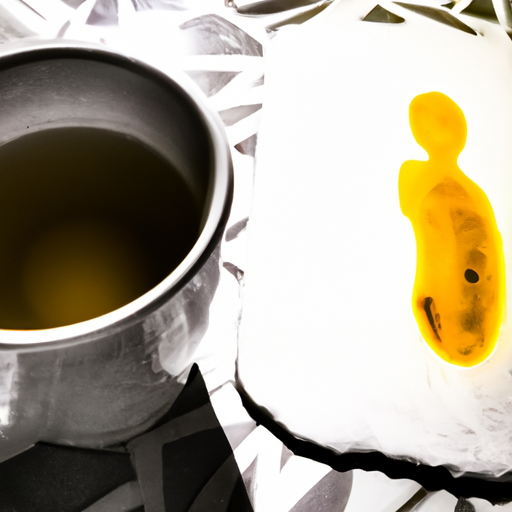Having dealt with kidney stones myself, I have developed a keen interest in how diet and nutrition impact their development. Lately, I’ve come across conflicting information about the effects of turmeric tea on kidney stones.
As a result, I decided to dive deeper into the scientific literature to determine whether there is any truth to these claims. For those unfamiliar, turmeric is a spice commonly used in Indian and Middle Eastern cuisine. It is also revered for its medicinal properties, including its anti-inflammatory and antioxidant effects.
However, some have suggested that consuming turmeric, particularly in the form of tea, may contribute to the formation of kidney stones. In this article, I will explore the connection between turmeric and kidney stones, the factors that contribute to their formation, and how we can use turmeric safely while still reaping its potential health benefits.
Key Takeaways
- Turmeric tea has anti-inflammatory and antioxidant properties and is used in traditional medicine for various health issues.
- High oxalate concentrations in turmeric can increase the risk of kidney stones in susceptible individuals.
- Adequate water intake and dietary changes are crucial for preventing kidney stones.
- Consuming too much turmeric tea can lead to adverse effects, and it is essential to consult a healthcare professional before use, especially for those with a history of kidney stones or other medical conditions.
Understanding Kidney Stones
You might start wondering how kidney stones form in your body and what factors can increase your risk of getting them. Kidney stones are hard, crystalline deposits that form in the kidneys or urinary tract. They can vary in size and shape, and their prevalence rates are increasing globally.
According to recent studies, about 1 in 10 people will develop kidney stones at some point in their lives. Some of the common risk factors for developing kidney stones include dehydration, a diet high in sodium and animal protein, obesity, and certain medical conditions such as gout and hyperparathyroidism. Genetics also plays a role, as individuals with a family history of kidney stones are more likely to develop them.
Now, let’s move on to the next section and explore what turmeric is and its potential effects on kidney stones.
What is Turmeric?
Imagine adding a spice to your cooking that’s been used for over 4,000 years and is still a staple in many cultures today. Turmeric, also known as Curcuma longa, belongs to the ginger family and has over 100 different components that are beneficial to your health. The main active ingredient in turmeric is curcumin, which has powerful anti-inflammatory and antioxidant properties.
Turmeric has been used for centuries in traditional medicine to treat various conditions, including digestive issues, respiratory infections, and skin diseases. One of the most popular ways to consume turmeric is by making turmeric tea. Benefits of turmeric tea include reducing inflammation, improving brain function, and easing joint pain. There are many recipes for turmeric tea blends, including adding honey, ginger, and black pepper to enhance flavor and increase the absorption of curcumin.
However, while turmeric tea has many potential health benefits, there are concerns about its potential negative effects on the kidneys. The connection between turmeric and kidney stones will be discussed in the subsequent section.
The Connection between Turmeric and Kidney Stones
Feeling concerned about the potential negative effects of consuming turmeric, especially for those who have a history of kidney issues? It’s important to know that turmeric can actually provide several benefits to our health. One of the most well-known benefits of turmeric is its anti-inflammatory properties. Curcumin, the active ingredient in turmeric, has been shown to reduce inflammation in the body, which can help alleviate symptoms related to arthritis, heart disease, and even certain types of cancer.
However, there has been some concern that turmeric may contribute to the formation of kidney stones. According to a study published in the Journal of Agricultural and Food Chemistry, high concentrations of oxalates in turmeric can increase the risk of kidney stone formation in susceptible individuals. While this may be a concern for some, it’s important to note that not all individuals who consume turmeric will develop kidney stones. Factors such as diet, lifestyle, and genetics can also play a role in the development of kidney stones.
Factors that Contribute to Kidney Stones
Factors such as diet, genetics, and lifestyle choices can play a significant role in the development and recurrence of kidney stones. Here are some of the different causes of kidney stones and how they can contribute to the formation of stones:
- Dehydration: Not drinking enough water can cause minerals to build up in the kidneys, leading to the formation of stones.
- High-sodium diet: Consuming too much salt can increase the level of calcium in the urine, which can lead to the formation of stones.
- Obesity: Being overweight can increase the risk of developing kidney stones by altering the balance of hormones and minerals in the body.
- Genetics: Some people are more susceptible to kidney stones due to genetic factors that can affect the way the body processes minerals.
Prevention of kidney stones involves making changes to your diet and lifestyle. This includes drinking more water, consuming less salt, maintaining a healthy weight, and getting regular exercise. By taking steps to reduce your risk of developing kidney stones, you can help protect your kidneys and maintain good overall health.
Moving on to the next section, it’s important to understand how turmeric affects the kidneys and whether it can contribute to the development of kidney stones.
How Turmeric Affects the Kidneys
As I delve into the subtopic of how turmeric affects the kidneys, it’s important to consider the metabolism and excretion of this spice within the body. Turmeric is mainly metabolized in the liver and excreted through the kidneys, making these organs essential in its elimination.
Understanding the impact of turmeric on kidney function and health is crucial in determining its overall safety for individuals with kidney issues.
Metabolism and Excretion
When we consume turmeric tea, our body metabolizes the compounds in it and then excretes the waste products through our kidneys. The efficiency of this process depends on our water intake and dietary habits. Adequate water intake is necessary for proper kidney function, as it helps to flush out toxins and waste products.
On the other hand, dehydration can lead to the formation of kidney stones. Therefore, it’s important to maintain proper hydration levels when consuming turmeric tea or any other herbal supplement. Additionally, it’s important to consider the safety and effectiveness of turmeric supplements.
While turmeric has been shown to have anti-inflammatory and antioxidant properties, excessive consumption or use of supplements may lead to adverse effects. This includes gastrointestinal problems and kidney damage. It’s recommended to consult a healthcare professional before starting any new supplement or making significant changes to one’s diet.
In the next section, I’ll discuss the importance of kidney function and health in relation to turmeric consumption.
Kidney Function and Health
Maintaining healthy kidneys is crucial for your overall well-being, and neglecting to take care of them can be a real pain in the butt – literally.
Kidneys play a vital role in filtering waste and excess fluids from the body, regulating blood pressure, and producing hormones that promote red blood cell production. However, kidney function can be affected by common issues such as urinary tract infections, kidney stones, and chronic kidney disease.
To prevent these issues, it’s important to adopt healthy lifestyle habits such as staying hydrated, avoiding smoking and excessive alcohol consumption, and maintaining a healthy weight. In addition to lifestyle changes, dietary recommendations can also support kidney health.
Eating a balanced diet that includes fruits, vegetables, whole grains, and lean protein sources can help prevent kidney damage and reduce the risk of developing kidney stones. Herbal remedies such as chamomile, ginger, and cranberry may also provide some kidney-protective benefits.
However, it’s important to consult with a healthcare provider before trying any herbal remedies, as they may have interactions with other medications or health conditions. In the next section, we’ll explore the potential relationship between turmeric tea and kidney stones.
Turmeric Tea and Kidney Stones
In this subtopic, I’ll be discussing the effects of turmeric tea on kidney stones. There are different types of turmeric tea, and the dosage and frequency of intake may vary depending on the individual.
It’s important to examine the evidence-based research on how turmeric tea can impact the development and management of kidney stones.
Types of Turmeric Tea
You can try different types of turmeric tea to find the one that suits your taste buds best. Turmeric tea flavors can range from plain turmeric to mixed varieties with ginger, cinnamon, and honey added. Some people prefer to drink turmeric tea in the morning as a replacement for coffee or tea, while others prefer it in the evening for its relaxing properties.
It’s important to note that adding milk or sugar to turmeric tea may decrease its health benefits. When trying different types of turmeric tea, it’s also important to consider the dosage and frequency of consumption. While turmeric is generally safe for most people, consuming too much may lead to side effects such as nausea and diarrhea.
It’s recommended to start with a small amount and gradually increase the dosage if needed. Additionally, it’s recommended to consume turmeric tea in moderation, around 1-2 cups per day. In the next section, we’ll discuss the dosage and frequency of turmeric tea consumption in more detail.
Dosage and Frequency
To get the most out of your turmeric tea, it’s important to know the right dosage and frequency for your body. While the recommended dosage for turmeric supplements is 500-2,000 mg per day, there isn’t a specific dosage recommendation for turmeric tea.
However, most experts suggest consuming 1-3 cups of turmeric tea per day to reap the benefits without overdoing it. When it comes to frequency, it’s recommended to space out turmeric tea consumption throughout the day rather than drinking it all at once.
This allows for a consistent intake of the beneficial compounds in turmeric and helps to prevent any potential negative side effects. It’s important to note that individual tolerance and sensitivity may vary, so it’s always best to start with a lower dosage and frequency and gradually increase if needed.
Moving forward, it’s important to be aware of other potential side effects of turmeric tea such as interactions with medications and digestive issues.
Other Potential Side Effects of Turmeric Tea
Be aware of possible side effects from turmeric tea, such as upset stomach, diarrhea, and allergic reactions, before incorporating it into your daily routine. While turmeric is generally safe to consume, excessive consumption may lead to other potential side effects like kidney stones.
A study published in the American Journal of Clinical Nutrition found that high levels of oxalate, a naturally occurring compound found in turmeric, can contribute to the formation of kidney stones. However, this study was conducted on rats and not humans. It is important to note that consuming turmeric in moderation and as recommended by medical professionals is unlikely to cause kidney stones. Nonetheless, those with a history of kidney stones or oxalate sensitivity should consult their healthcare provider before consuming turmeric tea. In the next section, we will discuss steps to prevent kidney stones.
Preventing Kidney Stones
By taking proper precautions and implementing healthy habits, avoiding kidney stones can be achievable.
Kidney stone prevention begins with making dietary changes, such as increasing water intake and reducing salt and animal protein consumption. Consuming an adequate amount of water on a daily basis can help dilute the substances in urine that form kidney stones.
On the other hand, a high intake of salt and animal protein can increase the concentration of calcium and uric acid in urine, leading to the formation of kidney stones. In addition, incorporating more fruits and vegetables into the diet can also help prevent kidney stone formation.
Fruits and vegetables contain high levels of potassium and magnesium, which can help regulate the levels of calcium and other substances in urine. By making these dietary changes, individuals can significantly reduce their risk of developing kidney stones.
Now, moving on to using turmeric safely…
Using Turmeric Safely
You’ll want to pay attention to some important tips when using turmeric safely in your cooking or as a supplement.
While turmeric has numerous health benefits, it is important to be aware of its potential side effects, especially when consumed in large amounts or for extended periods.
Some of the possible side effects include gastrointestinal issues, allergic reactions, and interference with certain medications.
To use turmeric safely, start with small amounts and gradually increase the dosage as tolerated.
You can also combine turmeric with other spices or herbs to enhance its flavor and nutritional value.
There are many turmeric recipes available online, including turmeric tea, which is a popular way to consume this spice.
Remember to consult with your healthcare provider before taking turmeric supplements, especially if you have a history of kidney stones or other medical conditions.
Frequently Asked Questions
What are some other potential health benefits of drinking turmeric tea?
As an evidence-based researcher, I have found that turmeric tea offers potential health benefits including anti-inflammatory properties and antioxidant effects. These benefits may help with various conditions such as arthritis, heart disease, and cancer.
Can turmeric supplements also increase the risk of developing kidney stones?
I researched the possible connection between turmeric supplements and kidney stones. Evidence suggests that excessive intake of turmeric supplements may increase the risk of developing kidney stones. This raises concerns about the possible risks of turmeric tea for kidney health.
Are there any specific groups of people who should avoid drinking turmeric tea?
Kidney stone prevention is important for those with dietary restrictions. While turmeric has health benefits, individuals with a history of kidney stones should avoid excessive consumption.
How can I incorporate turmeric into my diet without drinking it as a tea?
I like to incorporate turmeric into my diet by cooking with it or adding it to smoothies. Turmeric has anti-inflammatory properties and can provide numerous health benefits. There is no evidence to suggest that consuming turmeric in moderation can cause kidney stones.
Are there any studies or research that show a link between turmeric tea and a decreased risk for kidney stones?
Kidney stone prevention is possible with the consumption of turmeric tea, as some studies suggest. The anti-inflammatory properties of turmeric can also help with UTIs. More research is needed for conclusive evidence.
Conclusion
In conclusion, there’s no direct evidence linking turmeric tea to kidney stones. However, it’s important to be mindful of potential risks. Factors like kidney disease history or a diet high in oxalate can increase the likelihood of kidney stone development. Thus, it’s crucial to consult with a healthcare professional before adding turmeric tea to your diet.
For example, a person with a history of kidney stones who consumes large amounts of turmeric tea without professional advice may experience increased kidney stone formation due to the high oxalate levels in turmeric. This emphasizes the importance of caution and seeking advice before significant diet or lifestyle changes.










